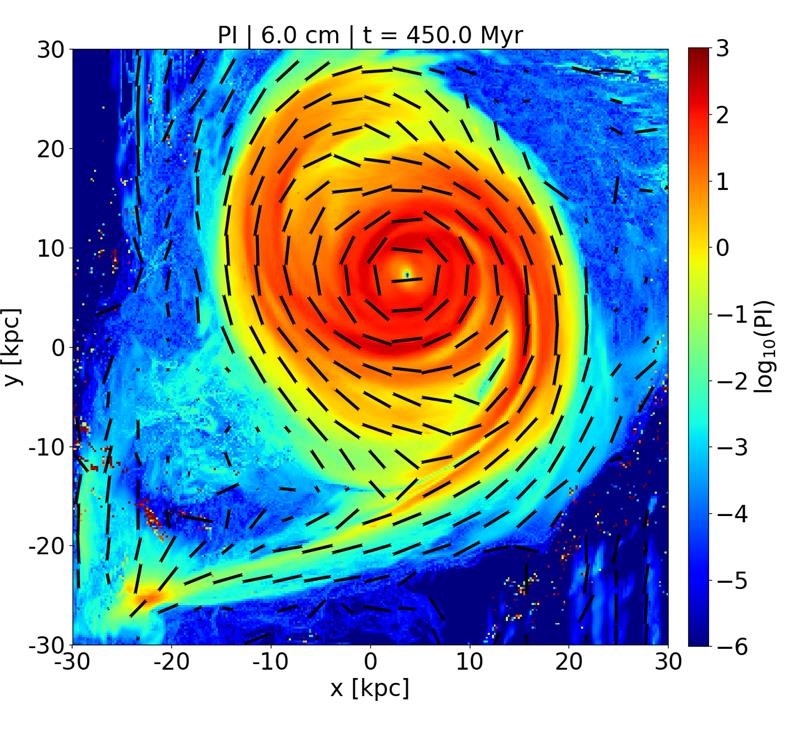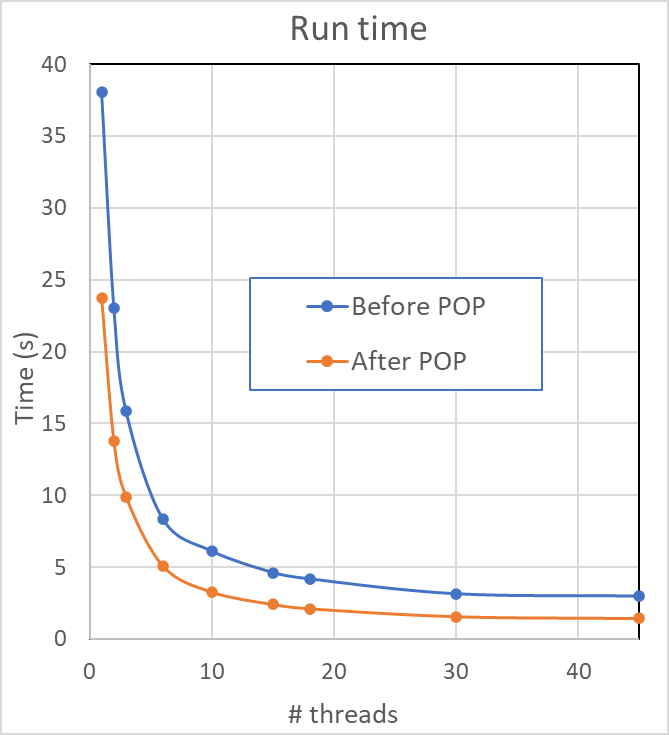Welcome to the 18th newsletter from the EU POP Centre of Excellence.
In this edition, we will introduce POP’s new metrics, targeting the analysis of hybrid codes, and present our new POPCast, which explores the question, “Why does code matter?” Training opportunities are described, including our performance analysis course, given by an all-female team and aimed at underrepresented groups in HPC. We will give details of the first workshop on Performance Engineering, Modelling, Analysis and Visualization Strategy (PERMAVOST), which is now calling for papers. The newsletter also offers plenty of interesting technical success stories, as well as details of where you can (virtually) meet POP staff.
If you would like to contribute technical content for this newsletter on the topic of parallel performance profiling, please contact us at pop@bsc.es.
This issue includes:
- POP Metrics for Hybrid Codes
- Recent POP webinar
- Identifying performance bottlenecks in hybrid MPI + OpenMP software
- New POPCast released
- “Why does code matter?”
- Technical Blogs
- Performance Improvements of More Than 30% and a Data Race Fixed for CalculiX Code
- Energy Efficiency Analysis of the Multilevel BDDC Solver Library (BDDCML)
- POP for Astronomy - 40% Reduction in Execution Time for the PIERNIK Code
- POP’s OpenMP Metrics: a case study
- Call for Papers
- 1st Workshop on Performance Engineering, Modelling, Analysis and Visualization Strategy (PERMAVOST)
- Performance Tuning Workshops
- Virtual VI-HPS Tuning Workshops
1 to 3 March 2021 | Online - POP Performance Analysis, Methodology and Tools for Women and Underrepresented Groups in the HPC Community
19 to 21 April 2021 | Online - 2021 Code Performance Series: From analysis to insight
11 March, 15 April, 20 May | Online
- Virtual VI-HPS Tuning Workshops
- POP Online Training
- Advanced Training Modules
- POP Out and About
- 3rd EMMC International Workshop 2021, 2 to 4 March 2021 | Online
- Other Events
- Webinar: A practical perspective to quantum computing
- The POP Helpdesk
For past editions of the newsletter, see the POP newsletter web page.
POP Metrics for Hybrid Codes
We have been very busy recently promoting the new POP ‘multiplicative’ and ‘additive’ metrics, which have been carefully designed for software engineers who want to optimise hybrid MPI+OpenMP codes. We think the POP metrics are an important tool for anyone wanting to gain insight into what aspects of parallelisation to investigate to improve performance. If you are unfamiliar with the philosophy behind the POP metrics, then the introduction on our training page is a good place to start. For the new metrics for hybrid codes, we recommend you view our recent POP webinar, detailed in the following section of the newsletter. A good follow-up to this would be the article POP Standard Metrics for Performance Analysis of Hybrid Parallel Applications, which fills in some of the detail. There is also a more in-depth look at the additive hybrid metrics here.
Please visit our learning material page for a full list of the documentation available on the POP metrics.
Recent POP Webinar
In our first webinar of 2021, Judit Giménez of BSC and Jonathan Boyle of NAG smashed all attendance records with their informative presentation, Identifying Performance Bottlenecks in Hybrid MPI + OpenMP Software. The recording, slides and handouts can all be found here.
Browse the list and catch up on all our previous webinars here.
Expect more webinar announcements soon!
New POPCast released
 We are pleased to announce the release of a new POPCast, the fourth in a series of interviews, which shine a light on what we do, how we do it and all the benefits that can be brought to your parallel code. In this POPCast, Jonathan Boyle, an HPC Application Analyst for POP, chats to our regular host Fouzhan Hosseini about why code matters, its value to the customer, and how we work with customers to increase that value.
We are pleased to announce the release of a new POPCast, the fourth in a series of interviews, which shine a light on what we do, how we do it and all the benefits that can be brought to your parallel code. In this POPCast, Jonathan Boyle, an HPC Application Analyst for POP, chats to our regular host Fouzhan Hosseini about why code matters, its value to the customer, and how we work with customers to increase that value.
View all the POPCasts on the POP YouTube Channel here.
Technical Blogs
Performance Improvements of More Than 30% and a Data Race Fixed for CalculiX Code
POP used correctness checking tools to identify and fix a data race in the CalculiX code and then made major improvements to both the code’s I/O and its load-balancing to give an overall performance improvement of over 30%. Our work on this code is ongoing.
Click here to read the article.
Energy Efficiency Analysis of the Multilevel BDDC Solver Library (BDDCML)
POP recently undertook its first performance analysis looking at optimising the energy efficiency of a code. This study looked at the Multilevel BDDC Solver Library and showed how it is possible to reduce its energy consumption by around 31%.
Click here to read the article.
POP for Astronomy - 40% Reduction in Execution Time for the PIERNIK Code
 This performance assessment on an astrophysical fluid simulation code showed the developers where to focus their attention, allowing them to make changes leading to a 40% reduction in the overall execution time.
This performance assessment on an astrophysical fluid simulation code showed the developers where to focus their attention, allowing them to make changes leading to a 40% reduction in the overall execution time.
Click here to read the article.
POP’s OpenMP Metrics: a case study
 This study demonstrated the power of the POP metrics in understanding poor performance in an OpenMP code. The metrics identified that 45% of the run time was inefficiency due to serial computation and imbalance, issues that were then easily fixed. An additional analysis after making the code improvements quantified the specific contributions of the implemented changes to the two times speedup achieved.
This study demonstrated the power of the POP metrics in understanding poor performance in an OpenMP code. The metrics identified that 45% of the run time was inefficiency due to serial computation and imbalance, issues that were then easily fixed. An additional analysis after making the code improvements quantified the specific contributions of the implemented changes to the two times speedup achieved.
To read more, click here.
Call for Papers
The first workshop on Performance Engineering, Modelling, Analysis and Visualization Strategy (PERMAVOST) is now calling for papers. We are looking to gain perspectives from performance tools developers, domain scientists and application developers on how to better understand code performance. For full details, please visit https://permavost.github.io/.
The PERMAVOST workshop will be an online event on June 25th, 2021, in conjunction with ACM HPDC 2021, the 30th International Symposium on High-Performance Parallel and Distributed Computing.
Performance Tuning Workshops
VI-HPS Tuning Workshops
1 - 3 March 2021 | Online
POP experts will give an overview of the VI-HPS programming tools suite, explain the functionality of individual tools, and how to use them effectively, and offer hands-on experience and expert assistance using the tools at the 38th VI-HPS Tuning Workshop at FAU Erlangen, Germany.
19 - 21 April 2021 | Online
An all-female team of POP experts will provide a training workshop on POP Performance Analysis, Methodology and Tools for Women and Underrepresented Groups in the HPC Community. It will give an overview of the POP CoE methodology; explain the functionality of POP performance tools, and how to use them effectively, as well as offering hands-on experience and expert assistance using the tools, with either your own application or the examples and benchmarks provided.
2021 Code Performance Series: From analysis to insight
11 March, 15 April, 20 May | Online
This series of workshops, as announced in the previous POP newsletter, continues with workshops on tracing in March, parallel correctness in April and a user workshop in May. This is an ExCALIBUR Knowledge Integration Activity in collaboration with POP, Durham’s Department of Computer Science, DiRAC and the N8 CIR (N8 Centre of Excellence in Computationally Intensive Research).
Click here to learn more about the workshops, including registration.
POP Online Training
In our last newsletter, we introduced our online training modules, a series of short training videos on topics related to performance optimisation and our methodology. We have now started to add a number of modules on more advanced topics. There are currently four modules aimed at users who already have some familiarity with Paraver:
- Paraver: Identifying Structure
- Start to understand your application behaviour and identify where to focus your analysis
- Paraver: See the Noise
- How to identify noise and assess its potential impact on the trace
- Paraver: Life without Noise
- How to estimate the impact of the noise on the code performance
- Paraver: On Sampling in Traces
- How to use Paraver to analyze sampled data
POP Out and About
3rd EMMC International Workshop 2021| 2 – 4 March 2021 | online
EMMC is the European Materials Modelling Council and this workshop brings together stakeholders from the various material modelling fields in academia and industry. If you are attending, make sure you stop by our virtual booth.
For more information on the conference, please click here.
If you feel that POP should be attending an event, please contact us at pop@bsc.es - suggestions are most welcome!
Other Events
Webinar: A practical perspective to quantum computing | 22 April 2021
The popular press has generated much hype surrounding quantum computing but gauging progress in the field can be quite difficult due to the unique language, properties and algorithms of quantum mechanics. Nevertheless, the promise of quantum algorithms and the rapid pace of advancements in quantum architecture merit a watchful eye on the field for any HPC provider or practitioner. This talk will give an overview of the fundamentals of quantum information theory, some basic code examples, an overview of several promising quantum algorithms and a practical outlook on the current status of quantum computing.
To register, please click here.
Apply For Free Help with Code Optimisation
We offer a range of free services designed to help EU organisations improve the performance of parallel software. If you are not getting the performance you need from parallel software or would like to review the performance of a parallel code, please apply for help via the short Service Request Form, or email us to discuss the service further and how it can be beneficial.
These services are funded by the European Union Horizon 2020 research and innovation programme so there is no direct cost to our users.
The POP Helpdesk
Past and present POP users are eligible to use our email helpdesk. Please contact our team of experts for help analysing code changes, to discuss your next steps and to ask questions about your parallel performance optimisation.

